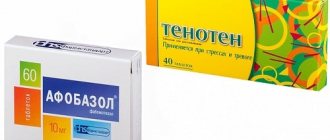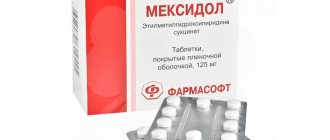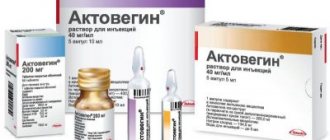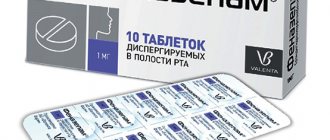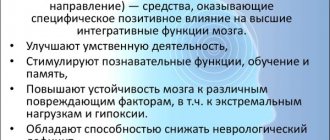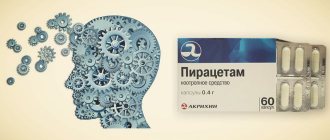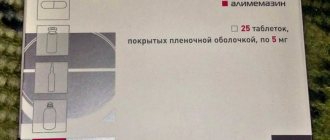Mexidol analogues, like Mexidol itself, have a nootropic effect on the patient, restore blood flow in the brain, and eliminate neurological disorders caused by damage to the organic tissues of the main center. A number of these products are available without a prescription, however, given the specifics, it is recommended to first consult a doctor. Find the answer Are you having a problem? Enter “Symptom” or “Name of the disease” into the form, press Enter and you will find out all the treatment for this problem or disease.
The site provides reference information. Adequate diagnosis and treatment of the disease is possible under the supervision of a conscientious doctor. Any medications have contraindications. Consultation with a specialist is required, as well as detailed study of the instructions! Here you can make an appointment with a doctor.
Some help in eliminating not only neurological, but also psychological personality changes.
Cheap analogues of Mexidol
You can buy substitutes in pharmacies at a lower cost, but the effectiveness of therapy does not change.
List of available analogues:
- Mexicor - from 250 rubles;
- Meksifin – from 260 rubles;
- Mexiprim - 400 rubles;
- Astrox – from 350 rubles;
- Neurox – from 380 rubles;
- Cerecard – 280 rubles;
- Medomexy – 260 rubles.
- Metostabil - from 240 rubles;
- Cavinton - from 231 rubles;
- Actovegin - from 602 rubles;
- Cerebronorm - from 300 rubles;
- Mildronate - from 214 rubles;
- Cortexin - from 847 rubles.
To compare the price of Mexidol:
Table - existing forms of the drug Mexidol with prices *
| Name | Manufacturer | Active substance | Price |
| MEXIDOL 0.05/ML 2ML N50 AMP RR IV V/M/ARMAVIR | ARMAVIR BIOFACTORY, FKP | Ethylmethylhydroxypyridine succinate | 2110.50 RUR |
| MEXIDOL 0.05/ML 2ML N50 AMP RR IV V/M/ELLARA | Ellara, LLC | Ethylmethylhydroxypyridine succinate | 2098.30 RUR |
| MEXIDOL 0.05/ML 5ML N5 AMP RR IV V/M/ARMAVIR | ARMAVIR BIOFACTORY, FKP | Ethylmethylhydroxypyridine succinate | 474.00 RUR |
| MEXIDOL 0.05/ML 2ML N10 AMP RR IV IM/ARMAVIR | ARMAVIR BIOFACTORY, FKP | Ethylmethylhydroxypyridine succinate | 492.80 RUR |
| MEXIDOL 0.05/ML 2ML N10 AMP RR IV V/M/ELLARA | Ellara, LLC | Ethylmethylhydroxypyridine succinate | 490.40 RUR |
| MEXIDOL 0.125 N50 TABLE P/PLEN/COACH | ZiO-Zdorovye, JSC | Ethylmethylhydroxypyridine succinate | 443.50 RUR |
| MEXIDOL 0.05/ML 5ML N5 AMP RR IV V/M/ELLARA | Ellara, LLC | Ethylmethylhydroxypyridine succinate | 464.40 RUR |
| MEXIDOL 0.125 N30 TABLE P/PLEN/COACH | ZiO-Zdorovye, JSC | Ethylmethylhydroxypyridine succinate | 269.70 RUR |
| MEXIDOL FORTE 250 0.25 N40 TABLE P/PLEN/COACH | ZiO-Zdorovye, JSC | Ethylmethylhydroxypyridine succinate | 646.90 RUR |
| MEXIDOL 0.05/ML 5ML N20 AMP RR IV V/M/ARMAVIR | ARMAVIR BIOFACTORY, FKP | Not available |
About the drug
It is a tablet coated with a thin film coating. Includes a complex organic compound - ethylmethylhydroxypyridine succinate. The drug blocks fat oxidation and increases the fluidity of the cell membrane. The drug also increases the transport of neurotransmitters and the transmission of nerve impulses. Positively affects blood supply to the brain and metabolic processes in tissues. In addition, it relieves the patient from memory impairment, attention problems, and disruptions in the sleep-wake cycle.
Mexidol tablets are prescribed when the following conditions develop:
- vegetative-vascular dystonia (VSD);
- traumatic brain injury (as part of complex therapy);
- cardiac ischemia;
- encephalopathy of various origins;
- neurosis;
- pronounced stress.
According to the instructions for use, to eliminate the clinical picture you need to take 1-2 tablets three times a day. The daily dosage should not exceed six tablets (800 mg). The volume of medication should be gradually increased and gradually withdrawn. How to replace Mexidol for convenience and saving money?
Indications for use
It is necessary to dwell in more detail on what are the indications for taking both medications. Mexicor is prescribed for:
- ischemic stroke;
- complex therapy of ischemic heart disease;
- encephalopathy;
- cognitive disorders of varying severity;
- myocardial infarction;
- pathological processes in the vessels of the brain.
Mesquidol is used for:
disorders in cerebral circulation;- reducing the risk of severe consequences of traumatic brain injuries;
- progression of insufficiency of blood supply to the brain;
- states of anxiety;
- myocardial infarction;
- glaucoma;
- vegetative-vascular disorders after alcohol intoxication;
- purulent processes in the abdominal cavity;
- peritonitis and necrotizing pancreatitis.
Mexidol can be included in complex preventive therapy for somatic disorders under the influence of various factors and high stress. In pediatric practice, both drugs are rarely used, only in cases of vital necessity.
Mexicor or Mexidol
Sold as a solution for parenteral (intravenous or intramuscular) administration. It looks like a transparent, colorless liquid that does not have a specific odor. The active ingredient is ethylmethylhydroxypyridine succinate in an amount of 50 mg per milliliter.
The domestic drug increases the patient’s body’s resistance to damaging factors: shock, tissue ischemia, impaired blood supply, poisoning with ethyl alcohol and certain medications. Mexicor increases the functional activity of the heart muscle, increases the rate of metabolic processes, and reduces the area of necrotic tissue.
The Mexidol analogue has a beneficial effect on brain function, prevents the development of strokes by improving microcirculation, reducing lipid concentrations and slowing the growth of atherosclerotic plaques.
The medicine is well tolerated, however, the development of undesirable reactions cannot be ruled out. The list includes:
- dryness of the oral mucosa;
- subjective feeling of lack of air or heat spreading throughout the body (with intravenous administration);
- unpleasant taste in the mouth;
- insomnia;
- nausea;
- bloating.
If medical recommendations are violated, drug intoxication may develop. The clinical picture includes the above symptoms plus short-term arterial hypertension. Price – 150-400 rubles, it all depends on the region.
Table - existing forms of the drug Mexicor with prices *
| Name | Manufacturer | Active substance | Price |
| MEXICOR 0.05/ML 5ML N20 AMP R-R V/V V/M | ENZYME Firma, LLC | Ethylmethylhydroxypyridine succinate | 795.60 RUR |
| MEXICOR 0.05/ML 5ML N10 AMP R-R V/V V/M | ENZYME Firma, LLC | Ethylmethylhydroxypyridine succinate | 409.50 RUR |
| MEXICOR 0.05/ML 5ML N5 AMP R-R V/V V/M | ENZYME Firma, LLC | Ethylmethylhydroxypyridine succinate | 255.00 RUR |
| MEXICOR 0.05/ML 2ML N10 AMP R-R V/V V/M | ENZYME Firma, LLC | Ethylmethylhydroxypyridine succinate | RUR 352.70 |
| MEXICOR 0.1 N60 CAPS | MiraxBioPharma, JSC | Ethylmethylhydroxypyridine succinate | RUR 333.70 |
| MEXICOR 0.1 N30 CAPS | MiraxBioPharma, JSC | Ethylmethylhydroxypyridine succinate | 188.00 RUR |
| MEXICORE 0.1 N20 CAPS | MiraxBioPharma, JSC | Ethylmethylhydroxypyridine succinate | Not available |
Glycine or Mexidol - which is better?
Release form: tablets for sublingual use containing 100 mg of the active substance of the same name. Magnesium stearate and methylcellulose are added as auxiliary compounds. Sold 30 pieces per pack.
A cheap analogue of Mexidol is considered a metabolic drug. Affects the functional activity of the central nervous system. The medication reduces psycho-emotional stress, stimulates memory and attention. Tablets can improve sleep and reduce the effects of stress.
Glycine helps with the following diseases:
- deterioration of mental performance;
- psycho-emotional stress;
- neurosis;
- cardiopsychoneurosis;
- condition after traumatic brain injury;
- various encephalopathies;
- insomnia.
The treatment regimen is selected taking into account the type of disease, the patient’s age and the severity of the pathology. The details are described in the table below.
Table - Instructions for use of Glycine
| Type of disease | Age | Volume in tablets | Frequency of intake per day |
| Sleep disturbance | Children and adults | 0,5-1 | 20 minutes before bedtime |
| Ischemia of nervous tissue, stroke | Adults | 1-2 | 3 |
| Alcoholic encephalopathy | Adults | 1 | 2-3 |
| Organic brain damage | Up to 3 years | 0,5 | 2-3 |
| From 3 years and older | 1 | 2-3 | |
| Decreased memory and concentration | Children and teenagers | 1 | 2-3 |
The duration of therapy and the frequency of repetition of courses must be checked with the doctor.
Table - existing forms of the drug Glycine with prices *
| Name | Manufacturer | Active substance | Price |
| GLYCINE FORTE 0.25 N30 CHEEK TABLE | Kanonpharma production, JSC | Glycine | 44.30 RUR |
| GLYCINE 0.1 N100 TABLE HYPOGLONUS/BIOTICS/ | BIOTICS MNPK, LLC | Glycine | 64.00 RUR |
| GLYCINE 0.1 N50 TABLE SUBLANGUAGE /BIOTICS/ | BIOTICS MNPK, LLC | Glycine | 32.80 RUR |
| GLYCINE-BIO PHARMAPLANT 0.1 N50 TABLE SUBLANGUAGE | OZONE, LLC | Glycine | 32.80 RUR |
| GLYCINE-MCFP 0.1 N50 TABLE SUBLANGUAGE | Moskhimfarmpreparaty named after N.A. Semashko, JSC | Glycine | 25.00 RUR |
| GLYCINE FORTE 300MG VITAMIR WITH CHERRY FLAVOR N30 TABLES EACH 634MG | VITAMIR | 130.00 RUR | |
| GLYCINE D3 N12 TABLES INSTANTLY SOLUBLE | MALKUT NP, CJSC | 447.90 RUR | |
| GLYCINE FORTE 0.5 N60 TABLE D/RASASS | EVALAR | 228.90 RUR | |
| GLYCINE FORTE EVALAR N60 TABLE D/RASSAS | Evalar CJSC | 161.40 RUR | |
| GLYCINE FORTE N20 TABLE | Alina Pharma LLC | 53.10 RUR | |
| GLYCINE KA N18 TABLE D/RASSAS | Pharmaindustriya LLC | 65.00 RUR | |
| GLYCINE ECO N50 TABLES 0.1 G | Ecotex, LLC | 36.00 RUR | |
| GLYCINE EXTRA N20 TABLETS 600MG | Pharmstandard-Leksredstva OJSC | 54.50 RUR | |
| GLYCINE WITH VITAMIN C N60 TABLETS EACH 500MG | SESANA, LLC | 41.60 RUR | |
| GLYCINE FORTE EVALAR N20 TABLE D/RASSAS | Evalar CJSC | 76.40 RUR | |
| GLYCINE-ACTIVE N50 TABLETS 0.1 G | Pharmgroup, LLC | 37.70 RUR | |
| DOPPELHERTZ ACTIVE GLYCINE + B-VITAMINS N30 CAPS | DOPPELHERTZ | 224.00 RUR | |
| RAINBOW MOUNTAIN ALTAI GLYCINE BIO WITH POLLEN N20 CAPS 0.23 G EACH | Narine, LLC | 86.30 RUR | |
| RAINBOW MOUNTAIN ALTAI GLYCINE FORTE WITH MUMIE N20 CAPS 0.23 G EACH | Narine, LLC | 77.80 RUR | |
| RAINBOW MOUNTAIN ALTAI GLYCINE NATURAL WITH VITAMIN C N20 CAPS 0.23G EACH | Narine, LLC | 60.80 RUR | |
| PROPELLER VOLCANIC CLAY MASK + ACNE SCRUB “AZELOGLYCINE, VOLCANIC SAND + CLAY” 40ML | PROPELLER | 63.60 RUR | |
| NOW GLYCINE N100 CAPS PO 1184MG | NOW | 1200.70 RUR | |
| NESTI DANTE ROMANTICA SOAP WISTRINA AND LILAC 250.0 | NESTI DANTE | RUB 328.90 | |
| NESTI DANTE ROMANTICA FACE AND BODY CREAM WISTRINA AND LILAC 150ML | NESTI DANTE | 995.10 RUR |
Noben
https://www.youtube.com/watch?v=ytdeven-GB
Home » Other »
Loading…
Question for experts: Hypoxia often develops after a stroke. How can we supply more oxygen? I know about cylinders with compressed oxygen, but often just breathing is not enough, you need to use something else. Is there anything other than oxygen cocktails? In general, all the methods that you know are interesting. The problem is not theoretical, so your answers are very important.
Best regards, Deltrock Myself
Best answers
A complex of pharmacological drugs is used that improves oxygenation of the brain and reduces the effects of chronic ischemia. These are: 1) Antioxidants and antihypoxants (Mexidol, Mildronate, Cavinton); 2) Nootropics and noopeptides (piracetam, Cerebrolysin, Actovegin, Vasobral, Instenon, Gliatilin, Noben, Phenotropil);
3) Vasodilators (nicotinic acid, xanthinol nicotinate, trental);
glucose injections with Vit. With intravenous injection, piracetam, gingo biloba, more fresh air, more sleep
Video response
This video will help you figure it out
Answers from experts
To improve cerebral circulation? Well, you can, of course, take some medicine. Yes, they say that 80% of medicines are now fake. Try the cognac! It is more effective and dilates blood vessels very well.
cenarizin. But read the summary
Cavinton forte month, glycine, but in general it’s better to see a neurologist
More effective - see a doctor. And you can take piracetam 0.2 2 times a day.
Phenotropil course for 30 days, 1 pill
one of the best remedies is Cerebrolysin
Before saturating yourself with various chemicals (tablets), try a good remedy: pour 1 teaspoon of dill seeds (fruits) with 1 glass of boiling water, leave
(in a sealed container for 15 minutes, strain. Drink, the first time - 1/4 cup (hot or warm, the rest - sip, throughout the day.
Now a very good drug has appeared on the market - Noben. This is a shortened formula of Coenzyme Q. Gives excellent results.
Mexidol doesn’t seem to be bad for cleaning blood vessels, but it’s also harmless as a notropic. A neurologist prescribed it to me for headaches.
https://www.youtube.com/watch?v=https:accounts.google.comServiceLogin
Cortexin can burn the receptors in the brain and turn it into a vegetable. Just like Actovegin. Take Ceraxon with Mexidol and Noben. Don’t be foolish enough to convince yourself that Cortexin can only have a positive effect on you.
This may be an individual reaction, and even more so if the receptors are weakened. Baking drugs cannot be passed through the blood-brain barrier, and Cortexin is just like that (it bakes when injected). It is prohibited abroad, as is Actovegin.
Ceraxon and Noben are nootropics that nourish and protect membranes.
- A healthy spine is the key to your performance!
- CREATE NEW MESSAGE.
- But you are an unauthorized user.
If you register, you will be able to further track responses to your messages and continue the dialogue on interesting topics with other users and consultants.
In addition, registration will allow you to conduct private correspondence with consultants and other users of the site.
Noben and Mexidol are used for cerebrovascular accidents. Despite this, there are many differences between medications.
Noben contains idebenone as a medicinal component. It belongs to nootropic drugs. The drug is involved in the biosynthesis of glucose and ATP, which leads to improved metabolism in the brain. Noben has an antioxidant effect, slows down lipid peroxidation, prevents the membrane of nerve fibers and mitochondria from damage, and accelerates the elimination of lactates.
The drug has antiasthenic, psychostimulating, antidepressant and nootropic effects, the latter usually manifests itself after 25 days of treatment.
During therapy, blood circulation in the vessels of the brain improves, supplying its tissues with oxygen
After oral administration, the maximum concentration of the active substance in the blood is observed after 4 hours. It penetrates well through the BBB. Noben does not accumulate, even if the medicine is taken for a long time; it is excreted mainly in the urine.
It is prescribed to patients suffering from the following pathologies:
- Psychoorganic syndrome caused by impaired blood circulation in the brain and its natural aging.
- Cerebroasthenic disorders of various origins, including those caused by trauma, neurasthenia, vascular pathologies, which are manifested by memory impairment, weakening of attention, decreased mental performance, emotional instability, impotence, depression, headache, dizziness, ringing in the ears.
Mexidol is an antioxidant. The drug relieves seizures, has a nootropic and anxiolytic effect, and protects tissues from oxygen starvation. During therapy, the body's resistance to the negative effects of damaging factors, such as cerebral circulatory disorders, alcohol and psychoactive substance poisoning, shock, ischemia, and lack of oxygen, increases.
Mexidol enhances the therapeutic effect of anticonvulsants, tranquilizers, neuroleptics, antidepressants, sleeping pills, which makes it possible to reduce their dosage, as a result of which they are less likely to provoke unwanted reactions.
Mexidol is prescribed for the following diseases and conditions:
- Consequences of acute cerebral circulatory disorders, including after transient ischemic attacks, in the subcompensation stage (antioxidant agents are prescribed as preventive courses).
- Encephalopathies of various etiologies, including those caused by trauma, vascular pathologies, and metabolic disorders.
- Traumatic brain injury and its consequences.
- Neurocircular dystonia.
- Impaired cognitive function caused by atherosclerosis.
- Anxiety disorders accompanying neurotic and neurosis-like conditions.
- Coronary heart disease (simultaneously with other medications).
- Relief of abstinence in alcohol dependence with a predominance of vegetative-vascular, neurosis-like and post-abstinence disorders.
- Acute overdose of antipsychotic drugs.
- Asthenia.
Mexidol is prescribed to reduce the risk of somatic pathologies due to exposure to extreme factors.
Mexidol and Noben have the following similarities:
- They are contraindicated in cases of intolerance to their composition or renal failure.
- During treatment with these drugs, you need to be careful when driving a car and working with mechanisms that require fast reaction speed.
- Mexidol and Noben can be purchased at the pharmacy strictly according to a prescription, so they cannot be treated without consulting a doctor.
- Both medications are not used to treat minors, since it is unknown how they will affect the growing body.
Mexidol and Noben have many differences:
- Medicines are available in different dosage forms. Noben is sold in capsules, Mexidol is available in tablets and injections.
- Mexidol is contraindicated in liver failure.
- Noben can be taken during pregnancy and lactation. Mexidol is contraindicated for the treatment of these patients.
- Both drugs can cause allergies and dyspepsia. In addition, taking Noben may cause headaches, excessive agitation, and difficulty falling asleep, so the last dose of the drug should be no later than 17:00.
- If the recommended dosages are exceeded, Mexidol can cause drowsiness, and Noben, on the contrary, can cause emotional agitation. In both cases, the antidote is unknown, so sympathetic therapy is prescribed.
It is impossible to say unequivocally that Mexidol or Noben is better, since the drugs differ in their indications for use, have different compositions, contraindications and adverse reactions. Therefore, the doctor must decide which medication to treat, so that only a specialist can assess the advisability of using a particular drug, as well as select an adequate treatment regimen.
- For those who follow my reviews, it’s no secret that I really love my nerves and brains, with which I live and make a living, and therefore I see a neurologist and almost constantly take something healthy.
- In order not to overload my readers with unnecessary information, I will immediately describe my symptoms, against the background of which I was prescribed Mexidol:
- ✩ headaches due to fatigue, as well as when sleep patterns are disturbed (from moderate to severe, relieved with 1-2 tablets of Spazgan)
- ✩ anxiety, nervousness, asthenic syndrome
- ✩ nervous tic, involuntary clenching of the jaws
- ✩ fixation on events
- ✩ irritation, anger, anger
It is important to note that physiological (pain, tic) and emotional things are interconnected here and reinforce each other. Stress creates an imbalance in the head, improper functioning of brain vessels, headaches, and these, in turn, increase the inability to cope with stress, emotions, etc. increasingly.
Do you recognize yourself? Read on, the review will be useful to you.
- After looking at me carefully, the neurologist prescribed me the following treatment:
- Phlebodia - 1 tablet in the morning on an empty stomach (venotonic)
- Mexidol - 3 tablets per day in the morning, lunch and evening
- Cymbalta - 1 tablet per day in the morning (antidepressant)
Mexidol was an optional drug in the sense that the main thing was the presence of the main active ingredient - ethylmethylhydroxypridine. The choice was Mexidol, Mexiprim, Mexi B6. First I bought Mexiprim (365 rub.
https://www.youtube.com/watch?v=upload
for 60 tablets) as the cheapest, then Mexidol (470 rubles for 50 tablets). I didn’t notice any difference, so you can take a more budget analogue. But I did not find the drug Mexi B6 either in my city or in St. Petersburg.
During the first 7-10 days of the prescribed treatment (only Phlebodia, which I was already familiar with, was familiar), I experienced strange symptoms associated with starting to take Cymbalta. I will write about it later and in great detail, because... Reviews for this antidepressant are literally rare.
- Then I adapted to the new drugs and began to notice positive effects in the form of:
- ✩ easy control of stressful situations and your own emotions
- ✩ reduction and almost complete disappearance of headaches under the same conditions
- ✩ absence of nervous tics
- All that was left was the clenching of the jaws.
- neurometabolism activators (actovegin, L-carnitine),
- Cognitives (piracetam, cholinergics (lecithin),
- calcium antagonists (cinnarizine, flunarizine) and other MAO inhibitors.
Armadin or Mexidol - what to choose
The main compound is the substance of the same name with a complex chemical formula in an amount of 125 mg. The medicine is an antioxidant with a wide spectrum of action. Armadin calms the nervous system, prevents memory impairment, and increases mental performance. The drug reduces the toxic effect of ethyl alcohol on the body and increases blood supply to the brain.
Pharmacodynamics is based on blocking fat oxidation, increasing the binding of enzymes to ligands, increasing the transport of neurotransmitters and transmitting electrical impulses from one nerve cell to another.
It is prescribed to stabilize the condition in such pathologies as:
- condition after a stroke;
- neurosis;
- neurocirculatory (vegetative-vascular) dystonia;
- asthenia;
- encephalopathy of any origin;
- myocardial ischemia;
- asthenia;
- withdrawal syndrome;
- poisoning with antipsychotic drugs.
After administration, the Mexidol analogue quickly dissolves in the digestive tract. The half-life is 4-5 hours. Breaks down into metabolites in the liver. It is excreted mainly in the urine.
Composition, properties and mechanism of action
Both medications contain one main active ingredient – ethylmethylhydroxypyridine succinate. The most important way Mexicor differs from Mexidol is the amount of active ingredient. Mexicor contains 100 mg, and Mexidol contains 125 mg. Medicines also differ in the list of excipients, due to which the indications for use partially differ.
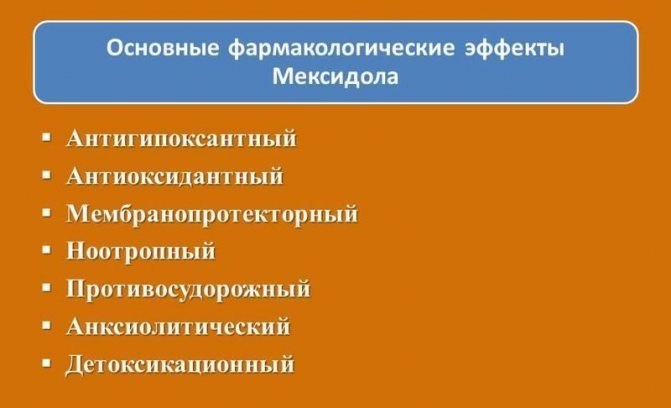
The effects of the drugs are very similar. They are antioxidants and actively reduce the number of free radicals in the body, providing:
- improvement of myocardial function;
- normalization of blood circulation in the brain;
- reducing the likelihood of developing a stroke.
They are prescribed in combination with other drugs to stabilize neurotic conditions of varying degrees. The drugs help improve memory and develop cognitive abilities. Often prescribed to older people, especially after strokes, for faster recovery, both physical and mental, to reduce the risk of brain disorders.
Both drugs are also used in the treatment of people who abuse alcohol. They are prescribed for alcohol poisoning accompanied by neurological or neurotoxic symptoms.
It is important to consider the calming effect of both drugs on the nervous system when prescribing sleeping pills. They are prohibited for people whose profession involves activities that require increased concentration.
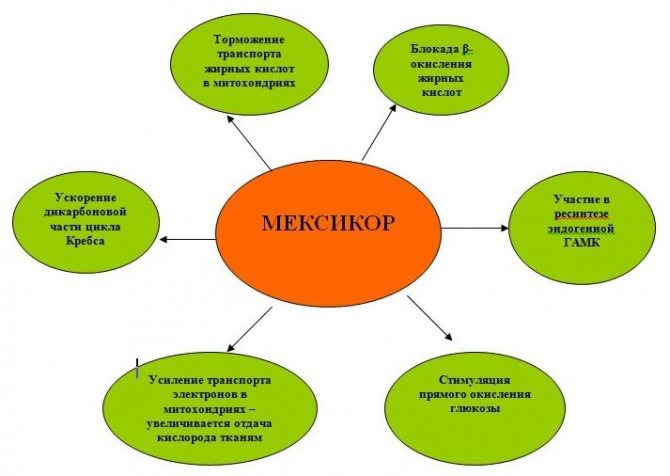
Mexico's effects on the body
The drugs are similar in their mechanism of action. Research has revealed that both of them have anticonvulsant, neuroprotective and anti-inflammatory properties. The antioxidant properties of ethylmethylhydroxypyridine succinate are associated with the activation of the enzyme superoxide dismutase.
Ethylmethylhydroxypyridine succinate activates cellular glycolysis and the mitochondrial respiratory chain, due to which the body stores energy at the cellular level. This important property is necessary for ischemia, heart attacks, when cellular hypoxia develops.
Mexiprim or Mexidol - which is better?
The Russian medicine is covered with a thin film shell, has a round shape and a cream color. It contains the same active substance as Mexidol, so the mechanism of action and indications are similar to this drug.
To eliminate pathologies, 250-500 mg of Mexiprim are usually prescribed; the maximum daily volume of the drug should not exceed 800 mg. The amount of product is divided into 2-3 doses. The duration of treatment depends on the type of disease, the duration varies from 5 days to 6 weeks. The tablets should be discontinued gradually, reducing the dose over 2-3 days.
Possible side effects of mexiprim:
- nausea;
- dryness of the oral mucosa;
- formation of hypersensitivity;
- drowsiness.
It is prohibited to use Mexiprim if the patient has renal and/or liver failure, in childhood, during pregnancy and lactation.
Table - existing forms of the drug Mexiprim with prices *
| Name | Manufacturer | Active substance | Price |
| MEXIPRIM 0.05/ML 2ML N10 AMP RR D/IN | Moscow Endocrine Plant, Federal State Unitary Enterprise | Ethylmethylhydroxypyridine succinate | RUR 359.10 |
| MEXIPRIM 0.125 N60 TABLE P/PLEN/COACH | Obninsk Chemical and Pharmaceutical Company CJSC | Ethylmethylhydroxypyridine succinate | RUR 327.60 |
| MEXIPRIM 0.125 N30 TABLE P/PLEN/COACH | Obninsk Chemical and Pharmaceutical Company CJSC | Ethylmethylhydroxypyridine succinate | 181.50 RUR |
| MEXIPRIM 0.05/ML 5ML N5 AMP R-R V/V V/M | POLYSAN NTFF, LLC | Ethylmethylhydroxypyridine succinate | RUR 310.40 |
Cavinton or Mexidol
The main component is vinpocetine. The imported substitute Mexidol has a greater effect on the metabolic processes taking place in the cells of the nervous tissue of the brain and on the blood supply to the central nervous system. The medicine increases glucose consumption, increases the rate of carbohydrate breakdown in order to obtain additional energy. It has an antioxidant effect, inhibits platelet aggregation, thereby reducing blood viscosity.
It is usually well tolerated by patients, and side effects occur very rarely. The list looks like this:
- changes on electrocardiography;
- increased heart rate;
- changes in blood pressure;
- sleep disorders;
- weakness;
- headache;
- dizziness;
- nausea;
- heartburn;
- allergy.
It can be combined with a large number of medications without fear of complications. The patient does not complain when interacting with beta-blockers, cardiac glycosides, clopamide and hydrochlorothiazide.
Sometimes, when combined with methyldopa, the decrease in blood pressure increases, therefore, when using Cavinton and centrally acting antihypertensive drugs, it is important to regularly monitor blood pressure.
Table - existing forms of the drug Cavinton with prices *
| Name | Manufacturer | Active substance | Price |
| CAVINGTON COMFORT 0.01 N90 TABLE DISPERG | Gedeon Richter OJSC | Vinpocetine | 640.30 RUR |
| CAVINTON COMFORT 0.01 N30 TABLE DISPERG | Gedeon Richter OJSC | Vinpocetine | 284.70 RUR |
| CAVINGTON FORTE 0.01 N90 TABLE | Gedeon Richter – Rus ZAO | Vinpocetine | 723.70 RUR |
| CAVINGTON 0.005/ML 10ML N5 AMP END D/R-RA D/INF | Gedeon Richter OJSC | Vinpocetine | RUR 322.80 |
| CAVINTON 0.005/ML 5ML N10 AMP END D/R-RA D/INF | Gedeon Richter OJSC | Vinpocetine | RUR 314.00 |
| CAVINTON 0.005/ML 2ML N10 AMP END D/R-RA D/INF | Gedeon Richter OJSC | Vinpocetine | 229.10 RUR |
| CAVINGTON FORTE 0.01 N30 TABLE | Gedeon Richter – Rus ZAO | Vinpocetine | RUB 292.80 |
| CAVINGTON 0.005 N50 TABLE | Gedeon Richter – Rus ZAO | Vinpocetine | 239.80 RUR |
Side effects
Typically, they may not occur, but it is still better to be aware of the symptoms that you may have to face. It is worth paying attention that undesirable reactions to the components of the drug can cause serious harm to a person. Therefore, if your health suddenly deteriorates, you should consult a doctor. Main side effects:
- diarrhea;
- nausea;
- vomit;
- allergic manifestations;
- itching;
- drowsiness;
- fatigue;
- depressive disorders;
- anxiety states;
- migraine;
- increased sweating;
- increased blood pressure.
Important! If side effects are present, the doctor must reduce the dosage or completely reduce it.
Vinpocetine or Mexidol - which is better?
Similar in composition and pharmacodynamics to the previous drug. When it enters the digestive tract, Vinpocetine is quickly absorbed into the blood, binds to proteins by 66%, the maximum concentration in plasma is observed after an hour, in tissues after 2-4 hours. Metabolized in the liver, excreted in urine and feces.
The medication is used for the development of the following diseases:
- condition after ischemic stroke;
- vascular dementia;
- atherosclerotic lesions of meningeal vessels;
- encephalopathy due to high blood pressure or injury;
- damage to the retina or choroid;
- Meniere's disease.
Vinpocetine should not be used during pregnancy, as it crosses the placental barrier and enters the fetus. As a result of therapy, bleeding and spontaneous abortion may develop.
Table - existing forms of the drug Vinpocetine with prices *
| Name | Manufacturer | Active substance | Price |
| VINPOCETINE 0.005 N50 TABLE/IZVARINO/ | Izvarino Pharma, LLC | Vinpocetine | 127.30 RUR |
| VINPOCETINE 0.005 N50 TABLE /HUNGARY/ | Gedeon Richter OJSC | Vinpocetine | 140.60 RUR |
| VINPOCETINE 0.01 N30 TABLE /IZVARINO/ | Izvarino Pharma, LLC | Vinpocetine | 156.00 RUR |
| VINPOCETINE 0.005/ML 2ML N10 AMP END D/PREPARATION R-RA D/INF /BORISOV ZMP/ | Borisov Medical Preparations Plant, JSC | Vinpocetine | 66.10 RUR |
| VINPOCETINE 0.005/ML 2ML N10 AMP CONC D/R-RA D/INF | Biokhimik PJSC | Vinpocetine | 47.70 RUR |
| VINPOCETINE 0.005/ML 2ML N10 AMP CONC D/R-R/ELLARA | Ellara, LLC | Vinpocetine | 77.30 RUR |
| VINPOCETINE 0.005 N50 TABLE /PHARMPROJECT/ | Pharmproekt, JSC | Vinpocetine | 61.00 RUR |
| VINPOCETINE WELPHARM 0.005/ML 2ML N10 AMP CONC D/R-RA D/INF | WELFARM, LLC | Vinpocetine | 85.00 RUR |
| VINPOCETINE 0.005 N50 TABLE/UPDATE/ | Update of PFC JSC | Vinpocetine | 78.30 RUR |
| VINPOCETINE 0.005 N50 TABLE/BORISOV ZMP/ | Borisov Medical Preparations Plant, JSC | Vinpocetine | 60.50 RUR |
| VINPOCETINE 0.005 N50 TABLE/ALSI PHARMA | Alsi Pharma, CJSC | Vinpocetine | 64.30 RUR |
| VINPOCETINE FORTE 0.01 N30 TABLE /OZONE/ | OZONE, LLC | Vinpocetine | 78.80 RUR |
| VINPOCETINE FORTE 0.01 N30 TABLE /SYNTHESIS/ | Sintez AKOMPiI, OJSC (“Sintez” OJSC) | Vinpocetine | 92.00 RUR |
| VINPOCETINE 0.005 N50 TABLE/OZONE/ | OZONE, LLC | Vinpocetine | 66.30 RUR |
| VINPOCETINE FORTE CANON 0.01 N30 TABLE | Kanonpharma production, JSC | Vinpocetine | 76.20 RUR |
| VINPOCETINE-OBL 0.005 N50 TABLE | Obolenskoye Pharmaceutical Enterprise, JSC | Vinpocetine | 159.10 RUR |
| VINPOCETINE-OBL 0.01 N30 TABLE | Obolenskoye Pharmaceutical Enterprise, JSC | Vinpocetine | 138.00 RUR |
| VINPOCETINE-ACOS 0.005 N50 TABLE | Sintez AKOMPiI, OJSC (“Sintez” OJSC) | Vinpocetine | 77.20 RUR |
| VINPOCETINE-ALSI 0.005 N30 TABLE | Alsi Pharma, JSC | Vinpocetine | 38.90 RUR |
Vazobral or Mexidol
Vasobral tablets contain caffeine (40 mg) and alpha-dihydroergocriptine mesylate (4 mg). One blister contains 10 pcs. Additionally, the product includes:
- lactose;
- cellulose;
- magnesium stearate;
- silica.
A combined drug that inhibits alpha-adrenergic receptors. Stimulates the production of serotonin, dopamine, reduces the permeability of the vascular wall. It has a beneficial effect on metabolic processes in tissues, increases their blood supply, and increases the resistance of brain cells to a lack of oxygen. Due to caffeine, the medication stimulates mental performance, eliminates weakness, fatigue and drowsiness.
Vasobral is prescribed to patients with atherosclerosis of the meningeal vessels, vestibular disorders, dizziness of unknown origin, Meniere's disease. Foreign analogue, production – France.
Table - existing forms of the drug Vazobral with prices *
| Name | Manufacturer | Active substance | Price |
| VAZOBRAL N30 TABL | Chiesi Pharmaceuticals S.p.A./Pharmstandard-Leksredstva, OJSC | * | 1005.50 RUR |
Release form and composition of drugs
The first thing you should pay attention to when comparing is, of course, the release form. In addition to the standard oral form for such medications (tablets for Mexidol and capsules for Mexicor), both drugs are also available in injection form. The differences here are that the first is available in ampoules of two volumes: 2 ml and 5 ml. Whereas Mexicor only has 2 ml ampoules.
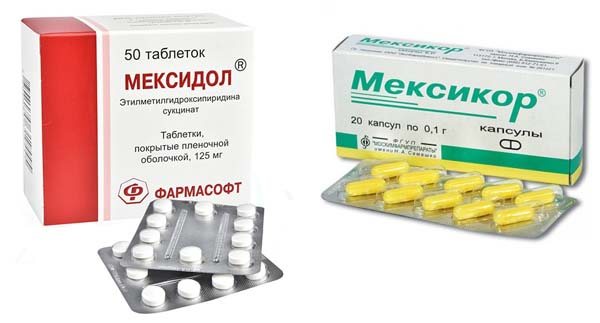
If we compare the composition of both of them, it turns out that their main substance is the same: ethylmethylhydroxypyridine succinate. What is the difference and whether it makes any sense at all to distinguish between these 2 medications, you need to find out by delving a little deeper into the information about the composition.
First of all, there is a significant difference in the dosage of the main substance: Mexidol has a little more than Mexicor, 125 mg versus 100 mg.
In addition, tablets and capsules contain a different set of additional components, which, one way or another, affects the treatment process. Mexicora contains a component such as succinic acid, which in itself is a good helper for people with neurological and vascular disorders. Therefore, Mexicor can be considered a combined remedy, while Mexidol is more concentrated on one main component.
Actovegin or Mexidol - which is better?
It is an antihypoxic agent that can replace Mexidol. The instructions describe three types of pharmacological action that are caused by these tablets:
- increasing the speed of metabolic processes;
- improvement of blood supply;
- stimulation of nervous tissue.
The analogue must be drunk before meals, without chewing and with a sufficient amount of water. The treatment regimen may look like this:
- ischemic stroke in the acute stage - 2000 per day intravenously, 20 infusions, then 2 tablets three times a day;
- dementia – 2 tablets 3 times a day for 4-5 months;
- diabetic polyneuropathy - 2000 per day intravenously, 20 infusions, then three tablets 3 times a day;
- impaired blood supply to the extremities - 1-2 tablets 3 times a day.
In some cases, the medication can cause an allergic reaction, redness of the skin, and hives. Manufacturer – Austria.
Table - existing forms of the drug Actovegin with prices *
| Name | Manufacturer | Active substance | Price |
| ACTOVEGIN 0.04/ML 2ML N25 AMP RR D/IN | Takeda Austria GmbH | Deproteinized hemoderivative of calf blood | 1329.70 RUR |
| ACTOVEGIN 0.2 N50 TABLE P/PLEN/COACH | Takeda Pharmaceuticals, LLC | Deproteinized hemoderivative of calf blood | 1394.50 RUR |
| ACTOVEGIN 0.04/ML 10ML N5 AMP RR D/IN | Takeda Pharmaceuticals, LLC | Deproteinized hemoderivative of calf blood | 1046.00 RUR |
| ACTOVEGIN 0.04/ML 5ML N5 AMP RR D/IN | Takeda Austria GmbH/ Takeda Pharmaceuticals, LLC | Deproteinized hemoderivative of calf blood | 550.50 RUR |
Contraindications
Mexidol injections are used for:
- the presence of neurological diseases;
- chronic disease of the arteries of the elastic and muscular-elastic type of cerebral vessels, with improper blood supply to the brain, which can suddenly be detected;
- vegetative-vascular dystonia of mixed type;
- additional treatment for cardiac ischemia;
- oxygen starvation of the brain;
- speech and attention disorders.
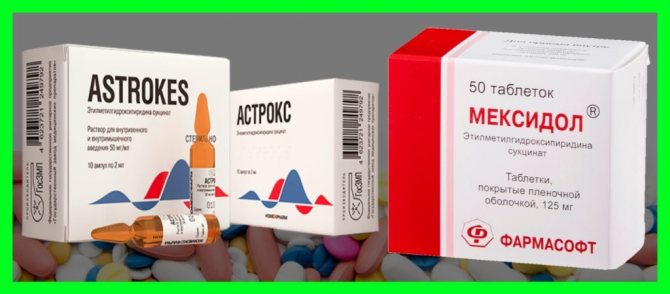
Injections are also prescribed for psychiatric diseases and disorders:
- alcoholism;
- poisoning with antipsychotic drugs;
- anxiety disorder.
Mexidol is used by surgeons in combination with other medications to treat inflammation of the peritoneum. The drug is used:
- After injury to the head or skull.
- When under stress.
- For purulent inflammation in the abdominal area.
- For glaucoma.
The drug is not recommended for use in the following cases:
- for kidney and liver diseases;
- in case of individual intolerance to one of the components included in the drug;
- under the age of sixteen;
- during pregnancy;
- during lactation. After all, elements of Mexidol can enter the baby’s body through milk and cause an undesirable reaction.
Important! If there are allergic reactions to the composition of the drug, you should consult a doctor. In this case, a medical specialist can prescribe an analogue of Mexidol, which can help cure diseases without harm to health.
"Mexidol" in ampoules is prescribed intravenously or intramuscularly. The dosage of the drug is determined according to the patient’s diagnosis and the severity of the disease. In rare cases, Mexidol is diluted with sodium chloride, using 200 milliliters per ampoule.
Typically, treatment begins with the use of 100 milligrams of Mexidol solution two to three times a day. The doctor may increase the dosage of the medicine if there are no side effects. The maximum daily dosage is 800 milligrams. The doctor can administer the drug:
- Jet. This procedure is carried out for about seven minutes, the solution is introduced slowly.
- Drip. Mexidol is administered 50 drops per minute.
Mexidol analogues in ampoules
Injections can increase the bioavailability of the drug, quickly change the patient’s well-being and relieve severe symptoms. For treatment, you must additionally purchase a syringe and familiarize yourself with the rules of the procedure. The most popular generics and cheap analogues of the drug Mexidol with good reviews from doctors and patients are described below.
Mexifin or Mexidol - which is better?
Release form: solution for parenteral administration, transparent with a yellowish tint. Like Mexidol, it contains ethylmethylhydroxypyridine succinate as the main substance in a volume of 50 mg per 1 ml.
Due to the similar composition, the medication causes the same medicinal effects. A similar product is absorbed orally in a short time (within a maximum of one hour) and is quickly distributed to organs and tissues. In the liver it breaks down into five metabolites, the half-life varies between 4-5 hours. Excreted from the body with urine.
If you follow the instructions and doctor's recommendations, it is usually well tolerated, and the course of therapy proceeds without complications. However, it is possible to develop an unpleasant taste in the mouth, bloating, drowsiness or excitability, nausea, and a feeling of lack of air.
Table - existing forms of the drug Meksifin with prices *
| Name | Manufacturer | Active substance | Price |
| MEXIFIN 0.05/ML 5ML N10 AMP R-R V/V V/M | FSUE NPC Pharmzashchita FMBA | Ethylmethylhydroxypyridine succinate | 277.30 RUR |
| MEXIFIN 0.05/ML 2ML N10 AMP R-R V/V V/M | FSUE NPC Pharmzashchita FMBA | Ethylmethylhydroxypyridine succinate | 174.40 RUR |
Neurox or Mexidol - what to choose
The medicine differs from Mexidol only in the release form, as it is sold in a pharmacy as a solution sealed in an ampoule. The effect on brain function, indications and contraindications are similar. When selecting a treatment regimen, it is necessary to take into account the patient’s condition and the severity of the underlying pathology. Treatment might look like this:
- acute disruption of the blood supply to the brain - first, intravenous drip 200-500 mg 2-4 times a day for two weeks, then intramuscularly 200-250 mg 2-3 times a day for 14 days;
- traumatic brain injury - 200-500 mg drip 2-4 times a day for two weeks;
- dyscirculatory encephalopathy - intramuscularly 200-250 mg 2 times a day;
- neurocirculatory dystonia, neuroses – 50-400 mg per day for two weeks;
- open-angle glaucoma - parenteral 100-300 mg per day.
In case of overdose and the occurrence of insomnia and arterial hypertension, symptomatic therapy is carried out.
Table - existing forms of the drug Neurox with prices *
| Name | Manufacturer | Active substance | Price |
| NEUROX 0.05/ML 2ML N50 AMP R-R IV V/M | Pharm, JSC | Ethylmethylhydroxypyridine succinate | 1051.00 RUR |
| NEUROX 0.05/ML 5ML N5 AMP R-R IV V/M | Pharm, JSC | Ethylmethylhydroxypyridine succinate | RUB 291.90 |
| NEUROX 0.05/ML 2ML N10 AMP R-R IV V/M | Pharm, JSC | Ethylmethylhydroxypyridine succinate | 269.40 RUR |
Cerecard or Mexidol - which is better?
The solution for intravenous or intramuscular administration contains 250 mg of ethylmethylhydroxypyridine succinate per ampoule. One cardboard package contains 5 or 10 ampoules each, one ampoule contains 2 ml of product.
The drug should not be used if a patient is diagnosed with functional liver or kidney failure, as against this background the rate of breakdown and elimination of the drug decreases and the risk of developing drug intoxication increases. It is impossible to treat with Cerecard if you are breastfeeding, pregnant in childhood or have hypersensitivity.
Cerecard can increase the effect of tranquilizers from the group of benzodiazepines, nitrates, levodopa, carbamazepine. Reduces the negative impact of ethyl alcohol on the human body.
Cytoflavin or Mexidol
Available in the form of a solution for intravenous administration. Includes several active connections:
- succinic acid (100 g);
- Riboxin (20 g);
- nicotinamide (10 g);
- riboflavin (2 g).
The Mexidol substitute in ampoules has all the pharmacological effects that are caused by the drugs described above. Cytoflavin is recommended for the treatment of cerebral infarction, the consequences of acute disruption of cerebral blood supply, toxic damage to the central nervous system (encephalopathy).
The undesirable effects of the medication are described in detail in the table below.
Table - Side effects of Cytoflavin
| Organ system | Symptoms |
| Immune | Allergic reaction |
| Quincke's edema | |
| Anaphylaxis | |
| Nervous | Tremor of limbs |
| Dizziness | |
| Psychomotor agitation | |
| Headache | |
| Cardiovascular | Increased heart rate |
| Chest pain | |
| Changes in blood pressure readings | |
| Paleness, redness of the skin | |
| Respiratory | Dyspnea |
| Dry cough | |
| Perverted perception of smells | |
| Digestive | Bitterness in the mouth |
| Dry mucous membranes | |
| Nausea | |
| Vomit | |
| Abdominal pain |
Cytoflavin can be used when driving vehicles and operating machinery. It is advisable for patients with diabetes to regularly measure their blood glucose levels.
Table - existing forms of the drug Cytoflavin with prices *
| Name | Manufacturer | Active substance | Price |
| CYTOFLAVIN 10ML N10 AMP RR V/V/DARK GLASS/ | POLYSAN NTFF, LLC | Inosine | 1049.10 RUR |
| CYTOFLAVIN 10ML N5 AMP SR V/V/DARK GLASS/ | POLYSAN NTFF, LLC | Nicotinamide | 594.00 RUR |
| CYTOFLAVIN N100 TABLE P/INTESTINAL SOLUTION/ENVEL | POLYSAN NTFF, LLC | Riboflavin | RUR 755.40 |
| CYTOFLAVIN N50 TABLE P/INTESTINAL SOLUTION/ENVANCE | POLYSAN NTFF, LLC | succinic acid | 429.30 RUR |
Cortexin or Mexidol
It is a powder for obtaining a solution for parenteral (intramuscular) administration. Contains the compound of the same name (5 mg), prepared from the cerebral cortex of livestock. The medicine normalizes the metabolism of substances responsible for excitation and inhibition of nerve cells, reduces the risk of developing convulsive syndrome, and has an antioxidant effect.
Indications for the use of the Mexidol analogue in cheaper ampoules are as follows:
- decreased blood supply to the brain;
- traumatic brain injury;
- encephalopathy of any origin;
- memory loss, inhibition of thinking;
- epilepsy;
- asthenia;
- cerebral palsy.
The drug should be administered only on the recommendation of a doctor after a full diagnosis. Cortexin must not be mixed with other solutions, including lidocaine. The dissolved powder cannot be stored or taken after storage.
Table - existing forms of the drug Cortexin with prices *
| Name | Manufacturer | Active substance | Price |
| CORTEXIN 0.01 N10 FLAC LIOPHIL D/R-RA V/M | GEROPHARM LLC | Livestock cerebral cortex polypeptides | 1234.90 RUR |
| CORTEXIN 0.005 N10 FLAC LIOPHIL D/R-RA V/M /D/DET/ | GEROPHARM LLC | Livestock cerebral cortex polypeptides | 780.90 RUR |
Instructions:
Clinical and pharmacological group
16.045 (Antioxidant drug)
Release form, composition and packaging
The solution for intravenous and intramuscular administration is colorless or slightly yellowish, transparent.
| 1 ml | 1 amp. | |
| ethylmethylhydroxypyridine succinate | 50 mg | 100 mg |
Excipients: sodium metabisulfite, water for injection.
2 ml - glass ampoules (5) - strip packs (2) - cardboard packs. 2 ml - glass ampoules (5) - strip packs (10) - cardboard packs.
The solution for intravenous and intramuscular administration is colorless or slightly yellowish, transparent.
| 1 ml | 1 amp. | |
| ethylmethylhydroxypyridine succinate | 50 mg | 250 mg |
Excipients: sodium metabisulfite, water for injection.
5 ml - glass ampoules (5) - blister packs (1) - cardboard packs. 5 ml - glass ampoules (5) - blister packs (4) - cardboard packs.
pharmachologic effect
Antioxidant drug. It has antihypoxic, membrane protective, nootropic, anticonvulsant and anxiolytic effects. The drug increases the body's resistance to the effects of various damaging factors, to oxygen-dependent pathological conditions (shock, hypoxia and ischemia, cerebrovascular accidents, intoxication with alcohol and antipsychotics /neuroleptics/).
Mexidol® improves cerebral metabolism and blood supply to the brain, improves microcirculation and rheological properties of blood, and reduces platelet aggregation. Stabilizes the membrane structures of blood cells (erythrocytes and platelets) during hemolysis. It has a lipid-lowering effect, reduces the content of total cholesterol and low-density lipoproteins.
Reduces enzymatic toxemia and endogenous intoxication in acute pancreatitis.
The mechanism of action of Mexidol is due to its antihypoxic, antioxidant and membrane protective effects. The drug inhibits the processes of lipid peroxidation, increases the activity of superoxide oxidase, increases the lipid-protein ratio, reduces the viscosity of the membrane, and increases its fluidity. Mexidol® modulates the activity of membrane-bound enzymes (calcium-independent phosphodiesterase, adenylate cyclase, acetylcholinesterase), receptor complexes (benzodiazepine, GABA, acetylcholine), which enhances their ability to bind to ligands, helps preserve the structural and functional organization of biomembranes, transport of neurotransmitters and improve synaptic transmission. Mexidol® increases the content of dopamine in the brain. Causes an increase in compensatory activation of aerobic glycolysis and a decrease in the degree of inhibition of oxidative processes in the Krebs cycle under hypoxic conditions with an increase in the content of ATP and creatine phosphate, activation of the energy-synthesizing functions of mitochondria, stabilization of cell membranes.
Pharmacokinetics
Suction
When Mexidol is administered in doses of 400-500 mg, Cmax in plasma is 3.5-4.0 mcg/ml and is achieved within 0.45-0.5 hours.
Distribution
After intramuscular administration, the drug is determined in the blood plasma within 4 hours. The average retention time of the drug in the body is 0.7-1.3 hours.
Removal
It is excreted from the body in the urine mainly in glucurone-conjugated form and in small quantities unchanged.
Dosage
Mexidol® is administered intramuscularly or intravenously (stream or drip). To prepare a solution for infusion, the drug should be diluted with isotonic sodium chloride solution.
Mexidol® is injected slowly over 5-7 minutes, dropwise at a rate of 40-60 drops/min. The maximum daily dose is 1200 mg.
In case of acute cerebrovascular accidents, Mexidol® is used in complex therapy in the first 10-14 days intravenously at a dose of 200-500 mg 2-4 times a day, then intramuscularly at a dose of 200-250 mg 2-3 times a day. within 2 weeks.
For traumatic brain injury and the consequences of traumatic brain injury, Mexidol® is used for 10-15 days intravenously at a dose of 200-500 mg 2-4 times a day.
For discirculatory encephalopathy in the decompensation phase, Mexidol® is used intravenously in a stream or drip at a dose of 200-500 mg 1-2 times a day for 14 days, then intramuscularly at 100-250 mg/day for the next 2 weeks.
For a course of prophylaxis of dyscirculatory encephalopathy, Mexidol® is prescribed IM at a dose of 200-250 mg 2 times a day for 10-14 days.
For mild cognitive impairment in elderly patients and anxiety disorders, Mexidol® is prescribed IM at a dose of 100-300 mg/day for 14-30 days.
For alcohol withdrawal syndrome, Mexidol® is administered in a dose of 200-500 mg intravenously or intramuscularly 2-3 times a day for 5-7 days.
In case of acute intoxication with antipsychotic drugs, Mexidol® is administered intravenously at a dose of 200-500 mg/day for 7-14 days.
In acute purulent-inflammatory processes of the abdominal cavity (acute necrotizing pancreatitis, peritonitis), Mexidol® is prescribed on the first day both in the preoperative and postoperative periods. The dose of the drug depends on the form and severity of the disease, the prevalence of the process, and variants of the clinical course. Discontinuation of the drug should be done gradually, only after a stable positive clinical and laboratory effect.
For acute edematous (interstitial) pancreatitis, Mexidol® is prescribed 200-500 mg 3 times a day intravenously (in isotonic sodium chloride solution) and intramuscularly.
For necrotizing pancreatitis of mild severity, Mexidol® is prescribed 100-200 mg 3 times a day intravenously (in isotonic sodium chloride solution) and intramuscularly.
For necrotizing pancreatitis of moderate severity - 200 mg 3 times a day intravenously (in isotonic sodium chloride solution).
For severe necrotizing pancreatitis - at a dose of 800 mg on the first day, with a double dose regimen, then - 200-500 mg 2 times a day with a gradual reduction in the daily dose.
In extremely severe forms of necrotizing pancreatitis, the initial dose is 800 mg/day until the manifestations of pancreatogenic shock are persistently relieved; when the condition is stabilized, 300-500 mg 2 times/day intravenously (in isotonic sodium chloride solution) with a gradual reduction in the daily dose.
Overdose
In case of overdose, drowsiness may develop.
Drug interactions
When used together, Mexidol® enhances the effect of benzodiazepine derivative anxiolytics, antiparkinsonian (levodopa) and anticonvulsant (carbamazepine) drugs.
Mexidol® reduces the toxic effect of ethyl alcohol.
Use during pregnancy and lactation
Mexidol® is contraindicated during pregnancy and lactation (breastfeeding) due to insufficient knowledge of the drug's effect.
Side effects
From the digestive system: nausea, dry mouth.
Other: allergic reactions, drowsiness.
Storage conditions and periods
List B. The drug should be stored out of the reach of children, in a dry place, protected from light at a temperature not exceeding 25°C. Shelf life: 3 years.
Indications
- acute cerebrovascular accidents;
— traumatic brain injury, consequences of traumatic brain injury;
- encephalopathy;
— vegetative-vascular dystonia;
— mild cognitive disorders of atherosclerotic origin;
- anxiety disorders in neurotic and neurosis-like conditions;
— relief of withdrawal syndrome in alcoholism with a predominance of neurosis-like and vegetative-vascular disorders;
- acute intoxication with antipsychotic drugs;
— acute purulent-inflammatory processes of the abdominal cavity (acute necrotizing pancreatitis, peritonitis) as part of complex therapy.
Contraindications
- acute liver dysfunction;
- acute renal dysfunction;
- hypersensitivity to the drug.
Strictly controlled clinical studies of the safety of the drug Mexidol® in children, pregnancy and breastfeeding have not been conducted.
special instructions
In some cases, especially in predisposed patients with bronchial asthma with increased sensitivity to sulfites, severe hypersensitivity reactions may develop.
Use for renal impairment
The drug is contraindicated in acute renal dysfunction.
Use for liver dysfunction
The drug is contraindicated in acute liver dysfunction.
Conditions for dispensing from pharmacies
The drug is available with a prescription.
